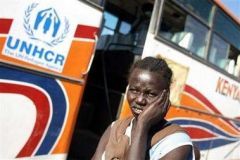South Sudanese return home after decade of exile
April 5, 2006 (BOR, Sudan) — As the hot African sun rose over the banks of the river Nile, 320 southern Sudanese crammed into a boat and chanted verses from the Bible before they set off on their way home after more than a decade in exile.
 “From the darkness into the light,” the mostly women and children from the Dinka tribe chanted. They waved crosses and rose to their feet on the battered barge, the vessel that would carry them home.
“From the darkness into the light,” the mostly women and children from the Dinka tribe chanted. They waved crosses and rose to their feet on the battered barge, the vessel that would carry them home.
They are some of thousands who fled their homes in Bor, the birthplace of First Vice President John Garang who led them for more than two decades in a bitter north-south civil war. Garang was killed in a helicopter crash last year just three weeks after taking office.
He signed a peace deal to end Africa’s longest civil war which paved the way for a coalition government, wealth sharing and democratic transformation in Sudan. It also aimed to protect the rights of non-Muslims in a country where Islamic sharia law was imposed in 1983.
Despite his death, the return of hundreds of thousands of refugees and displaced people is the strongest symbol that peace has come to the south, where decades of war have left many areas virtually untouched by modern life.
“I’m so happy because I’m going home,” said Peter Garang. “I will see my mother and the rest of my family at last,” he said.
The Dinka from Bor are wealthy with hundreds of thousands of heads of cattle, but they were scattered during the fighting. A year after peace they decided it was time to come home.
But the voyage through major towns in the south has been organized by aid agencies to avoid mass chaos as herds of cattle trample through urban centers.
“Our blessing is this peace,” said Michael Akol. “We are praying that it lasts and because we are finally able to come home,” he added.
The Dinka travel from various parts of southern Sudan to the capital Juba. There they sit patiently on a river barge which slowly threads its way along the world’s longest river, dodging crocodiles, to reach their home two days later.
Coughing, crying children keep homecomers up all night on the barge, testament to the dozens of diseases like cholera and meningitis which plagued the returnees on their long trek home.
SINGING, CHEERING, DRUMS
But sensing their home was near, they began to sing, cheer and bang drums until the barge approached Bor, greeted by waving relatives singing the same biblical verses on the river bank.
Some may be disappointed that the well-organized refugee camps of Kenya or Uganda are a long way from the basic amenities available in Bor. No roads, a dirt track runway and empty shell of an airport and a run-down brimming hospital only barely functioning after aid workers arrived.
“Things are hard here — it’s not like the city, there’s nothing here for us,” said Angelina Deng, who came by herself with her five children back home from the capital Khartoum.
“The problem with Khartoum is the rent is too high — but here I have a hut now and we live in peace.”
Deng said she would have to return to Khartoum to get money as there was no work in Bor and, although the soil was fertile, the men were not farming because they didn’t know how. Her husband is a soldier in Garang’s former rebel Sudan People’s Liberation Army (SPLA).
She said the SPLA soldiers had not been paid, but finally some money was coming in making life easier. “But thank God we have peace and I only hope it will last,” she said.
It seems she has reason to worry the peace may not last. First Vice President Dinka Salva Kiir, Garang’s successor, accused the northern army of continuing to support southern proxy militias to attack the SPLA.
He said these allied militia were being very aggressive toward the SPLA: “If they were not being supported by the SAF they would not be doing these things,” Kiir told journalists late on Monday night.
The first deadly clashes since last year’s peace deal between northern Sudanese Armed Forces (SAF) allied militia and the SPLA in early March in the oil-rich central region of Abyei killed at least 12 SPLA soldiers.
Abyei, where one of the south’s two main oil fields are located, remains a bone of contention between the north and south who both claim it as their own.
(Reuters)
